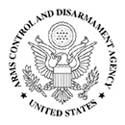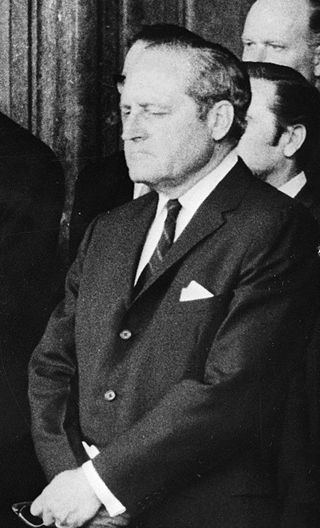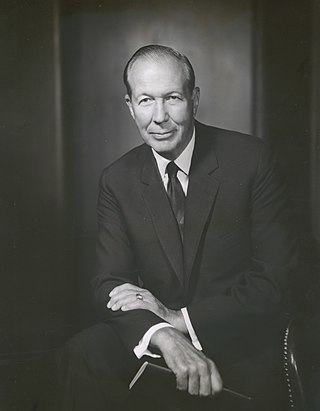Related Research Articles
Arms control is a term for international restrictions upon the development, production, stockpiling, proliferation and usage of small arms, conventional weapons, and weapons of mass destruction. Historically, arms control may apply to melee weapons before the invention of firearm. Arms control is typically exercised through the use of diplomacy which seeks to impose such limitations upon consenting participants through international treaties and agreements, although it may also comprise efforts by a nation or group of nations to enforce limitations upon a non-consenting country.

The Strategic Arms Limitation Talks (SALT) were two rounds of bilateral conferences and corresponding international treaties involving the United States and the Soviet Union. The Cold War superpowers dealt with arms control in two rounds of talks and agreements: SALT I and SALT II.

Cyrus Roberts Vance Sr. was an American lawyer and United States Secretary of State under President Jimmy Carter from 1977 to 1980. Prior to serving in that position, he was the United States Deputy Secretary of Defense in the Johnson administration. During the Kennedy administration he was Secretary of the Army and General Counsel of the Department of Defense.

The Intermediate-Range Nuclear Forces Treaty was an arms control treaty between the United States and the Soviet Union. US President Ronald Reagan and Soviet General Secretary Mikhail Gorbachev signed the treaty on 8 December 1987. The US Senate approved the treaty on 27 May 1988, and Reagan and Gorbachev ratified it on 1 June 1988.

Paul Henry Nitze was an American businessman and government official who served as United States Deputy Secretary of Defense, U.S. Secretary of the Navy, and Director of Policy Planning for the U.S. State Department. He is best known for being the principal author of NSC 68 and the co-founder of Team B. He helped shape U.S. Cold War defense policy over the course of numerous presidential administrations.

George Howard Earle III was an American politician and diplomat from Pennsylvania. He was a member of the prominent Earle and Van Leer families and the 30th governor of Pennsylvania from 1935 to 1939. Earle was one of just two Democrats who served as governor of Pennsylvania between the Civil War and World War II.

Thomas Earle was an American journalist, lawyer, and politician. The son of Pliny Earle, he was born in Leicester, Massachusetts, the descendant of Ralph Earle, one of the original petitioners of King Charles I to found the state of Rhode Island. His son was a Philadelphia lawyer George H. Earle, Sr. His grandson, born after his death, was noted "financial diplomat" George H. Earle, Jr. His great-grandson was George Howard Earle III, governor of Pennsylvania.

Paul Culliton Warnke was an American diplomat.

The United Nations Institute for Disarmament Research (UNIDIR) was established in 1980 by the United Nations General Assembly to inform States and the global community on questions of international security, and to assist with disarmament efforts so as to facilitate progress toward greater security and economic and social development for all.

The U.S. Arms Control and Disarmament Agency (ACDA) was an independent agency of the United States government that existed from 1961 to 1999. Its mission was to strengthen United States national security by "formulating, advocating, negotiating, implementing and verifying effective arms control, nonproliferation, and disarmament policies, strategies, and agreements."

Gerard Coad Smith was an American attorney and defense expert who served as the chief U.S. delegate to the Strategic Arms Limitation Talks (SALT) in 1969 and the first U.S. Chairman of the Trilateral Commission. He was awarded the Presidential Medal of Freedom on January 16, 1981 by President Jimmy Carter.

Florence Van Leer Earle Nicholson Coates was an American poet, and women's rights advocate whose prolific output was published in many literary magazines, some of it set to music. She was mentored by the English poet Matthew Arnold, with whom she maintained a lifelong friendship. She was famous for her many nature poems, inspired by the flora and fauna of the Adirondacks, where she lived. She was also an advocate for women and equality. She would be elected poet laureate of Pennsylvania by the state Federation of Women's Clubs in 1915.

George H. Earle Jr. was an American lawyer and businessman from Philadelphia who worked as a receiver and rescued multiple businesses from financial hardship. He was a political reformer and a member of the Committee of One Hundred in Philadelphia which worked to end bossism politics in the city.
David S. Wollan was an American physicist and arms control specialist.

Paula Adamo DeSutter was United States Assistant Secretary of State for Verification, Compliance, and Implementation from 2002 to 2009.
Thomas Graham Jr. is a former senior U.S. diplomat. Graham was involved in the negotiation of every single international arms control and non-proliferation agreement from 1970 to 1997. This includes the Strategic Arms Limitation Talks, the Strategic Arms Reduction Treaties, the Anti-ballistic missile (ABM) Treaty, Intermediate-Range Nuclear Forces Treaty (INF) Treaty, Treaty on the Non-Proliferation of Nuclear Weapons Treaty (NPT), Treaty on Conventional Armed Forces in Europe (CFE) Treaty and Comprehensive Nuclear-Test-Ban Treaty (CTBT). In 1993, Ambassador Graham served as acting director of the Arms Control and Disarmament Agency (ACDA) from January to November, 1993 and Acting Deputy Director from November, 1993 to July, 1994. From 1994 through 1997, he was president Bill Clinton's special representative for Arms Control, Non-Proliferation, and Disarmament. Graham successfully led the U.S. government efforts to achieve the permanent extension of the NPT in 1995. Graham also served for 15 years as the general counsel of ACDA. Throughout his career, Thomas Graham has worked with six U.S. Presidents including Presidents Richard Nixon, Gerald Ford, Jimmy Carter, Ronald Reagan, George H. W. Bush, and Bill Clinton. Ambassador Graham worked on the negotiation of the Chemical Weapons Convention and the Biological Weapons Convention and managed the Senate approval of the ratification of the Geneva Protocol banning the use of chemical and biological weapons in war, as well as the Biological Weapons Convention.
George Bunn was an American diplomat, lawyer, and nonproliferation expert. He drafted the legislation that created the U.S. Arms Control and Disarmament Agency (ACDA), was one of the lead U.S. negotiators of the nuclear Nonproliferation Treaty (NPT), served as Dean of the law school at the University of Wisconsin–Madison, and spent the last two decades of his career at the Center for International Security and Cooperation at Stanford University.

The Arms Control and Disarmament Act of 1961, 22 U.S.C. § 2551, was created to establish a governing body for the control and reduction of apocalyptic armaments with regards to protect a world from the burdens of armaments and the scourge of war.

William Chapman Foster was an American businessman and high-ranking government official. He served as United States Under Secretary of Commerce and United States Deputy Secretary of Defense under President Harry Truman. Later, he served as the first United States Arms Control and Disarmament Agency director, under Presidents John F. Kennedy and Lyndon B. Johnson.
The Van Leer family, originally spelled Von Lohr, is an influential German-American family that emigrated to the Province of Pennsylvania in the 17th century from the Electorate of Hesse near Isenberg, Germany. The family made their fortune in the United States through the ironworks business. The family includes American business owners, academics, civil rights activists, women's rights activists, university founders, inventors, politicians, and military officers. Earlier spellings include Von Leer, Von Lohr, and the ancient surname Valär.
References
- 1 2 3 Cook, Bonnie L. (17 January 2020). "Ralph Earle 2nd, a Philadelphia lawyer and lead negotiator in the SALT II arms control talks, dies at 91". www.inquirer.com. The Philadelphia Inquirer. Retrieved 19 August 2022.
- ↑ "Ralph Earle II". www.deerfield.edu. Deerfield Academy. Retrieved 19 August 2022.
- 1 2 3 4 Langer, Emily. "Ralph Earle II, arms control expert and SALT II negotiator, dies at 91". The Washington Post. Retrieved 19 August 2022.
- ↑ "WILLIAM VAN LEER GENERATION 9.3 – THIRD CHILD OF SAMUEL VANLEER". www.vanleerarchives.org. Van Leer Archives. Retrieved 19 August 2022.
- ↑ McLellan, Emily. "How Morgan Lewis Grew Into a Powerhouse on Its Own Terms". www.law.com. ALM Global. Retrieved 19 August 2022.
- ↑ Strong, Robert A. (2000). Working in the World - Jimmy Carter and the Making of American Foreign Policy. Baton Rouge: Louisiana State University Press. p. 40. ISBN 0-8071-2445-1 . Retrieved 19 August 2022.
- 1 2 Webb, Greg. "Ralph Earle II (1928-2020), Pursuing Arms Control to Strengthen Security". www.armscontrol.org. Arms Control Association. Retrieved 19 August 2022.
- ↑ "Directors of the U.S. Arms Control and Disarmament Agency". www.history.state.gov. United States Department of State. Retrieved 19 August 2022.
- ↑ Matthews, Francis J. (January 1980). Department of State Newsletter. Washington, D.C.: Department of State. p. 78. Retrieved 22 August 2022.
- ↑ ""2009 Heritage Award: Ralph Earle '46."". Archived from the original on 2015-04-19. Retrieved 2014-12-30.
- ↑ "Deerfield Academy Visions and Initiative page". Archived from the original on 2014-12-20. Retrieved 2014-12-30.
- ↑ "Army Cemeteries Explorer". www.ancexplorer.army.mil. U.S. Army. Retrieved 19 August 2022.